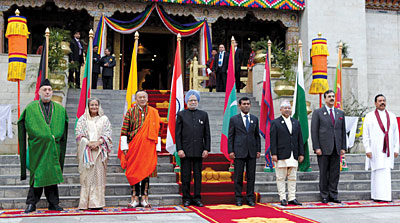 |
We know, now, that the neighbourhood worries Indian Prime Minister Manmohan Singh a great deal.
India has been so caught up with tailing its own shadow that in recent months the government seems to have pretty much taken its hand off the steering wheel. The Great Middle-Class Debate on corruption and black money, which is ending up looking rather farcical as government and civil society activists continue to spar over a proposed bill on this subject, is commanding all attention.
It was to stanch this flow of mixed messages and resultant despair that Manmohan Singh decided to call a select band of editors to hear him on a variety of subjects last week, not least on India's neighbouring countries.
"You didn't say anything on the neighbourhood," said one editor, after the prime minister had offered a tour de horizon on all the challenges that currently confronted India. "Well," the prime minister answered, "the neighbourhood worries me a great deal, quite frankly."
It was a forthright answer, given without hedging any bets, and it offered several insights into the mind of one of the most influential men in South Asia. Over the next couple of hours or so, there was something on Sri Lanka and Pakistan, Afghanistan and the US troop pullout from that country.
Nothing on Nepal. Nor on Bhutan, or the Maldives. Perhaps the PM believes those are the good news stories, or at least not a cause for immediate concern. Manmohan Singh's remarks on Sri Lanka, are in fact, quite extraordinary, especially because this is the first time since Sri Lankan president Mahinda Rajapakse won the civil war in 2009, after killing LTTE supremo Prabhakaran, that India has criticised him publicly.
Delhi maintained a formidable silence ever since Prabhakaran's death, including over the Channel Four documentary that showed chilling footage of Sri Lankan soldiers raping Tamil civilian women and maltreating the bodies of dead LTTE soldiers, because Rajapakse did for Delhi what no one else could do since Rajiv Gandhi was assassinated by the LTTE in 1991.
The quid pro quo was apparent, except no one talked about it. Delhi even supported Rajapakse's bid for power when he held early elections last year. Now Manmohan Singh has broken the silence, and come out on the side of what is right and just, even if the people concerned are weak and powerless.
"The decimation of the LTTE was something which is good. But the Tamil problem does not disappear, with the defeat of the LTTE. The Tamil population has legitimate grievances. They feel they are reduced to second-class citizens," the prime minister told editors.
Reducing the PM's concerns on the plight of Sri Lankan Tamils to domestic political arithmetic would be a mistake. It is true that Tamil Nadu chief minister Jayalalitha has offered the support of her nine AIADMK MPs to the Congress-led coalition in Delhi. However, the other Tamil Nadu party, the DMK, is so weakened after its implication in the 2G spectrum scandal, it really has no choice but to pay much more attention to the Congress party.
Manmohan Singh's courage in speaking up on Sri Lanka is in stark contrast with his undiplomatic remarks on Bangladesh in which he said the Jamaat-e-Islami party was anti-Indian and that it was supported by a quarter of Bangladeshis.
The gaffe has created a deep chasm of distrust in Dhaka just before Foreign Minister SM Krishna's visit this week. Sonia Gandhi is travelling there later this month and Manmohan Singh will go in September. The offending remarks have since vanished from the government website.
But on one point, the Prime Minister is right. India lives in a "very uncertain neighbourhood � we have to swim and keep our heads high." Lowering your eyes and re-reading the history books wouldn't be such a bad idea, either.



